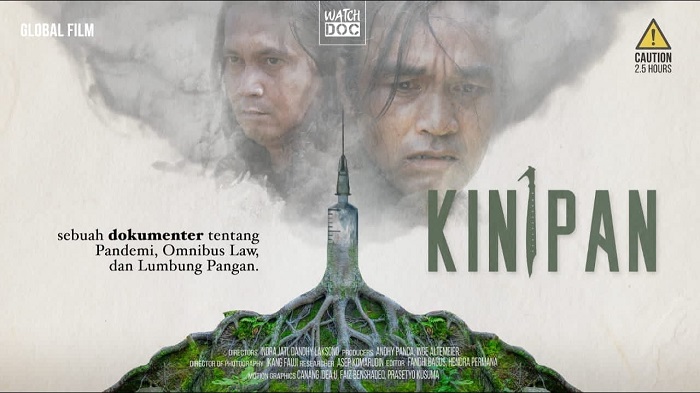How forest restoration and food estate policies affect local communities
Arfan Aziz
In August 2020, Efendi Buhing, a village leader from Kinipan in Central Kalimantan, was arrested for stealing a chainsaw belonging to an employee of a large oil palm plantation company operating near his home. Efendi was eventually released following protests from various civil society groups. Taking its title from the village at the centre of this struggle, Kinipan is the latest documentary film from WatchDoc, an Indonesian audiovisual production house founded in 2009 known for its sharply critical investigative style. WatchDoc has previously taken on Indonesia’s mining and plantation businesses in its 2020 film Sexy Killer.
Kinipan, directed by Indra Jati and Dhandy Laksono, examines the interplay between environmental damage, the 2020 Omnibus Law, the pandemic, the government’s Food Estate Policy for Food Security and the problematic activities of forest restoration companies.
After premiering in March 2020, Kinipan has been shown throughout Indonesia including in the village where it was made, in major cities and also at universities, including my own in Jambi. Since its release on YouTube, the documentary has been viewed more than 2.2 million times, and has trended through various social media channels.
Restoration effort
Kinipan is told in six chapters. Basuki and Feri, the two main subjects in the film, are central to conveying its key messages – the need for people-based forest governance and support for activists who work for the forest restoration, and the rejection of large-scale investments.
The film opens with a small boat floating on a river. Basuki and his friends are setting out on a journey to bring tree seeds to be planted inside Tanjung Puting National Park, Kalimantan. We follow them as they continue their journey by motorbike deep into the forest where the seeds are finally planted. Basuki has worked for 17 years in forest restoration activities. His goal is to return this depleted ecosystem into a thriving forest again. This will take a long time, Basuki explains, as the average growth of the trees is only around one millimetre a year.
Basuki’s restoration efforts bring him to the Kinipan forest in Lamandau Regency, Central Kalimantan, where he gathers seeds from trees native to this part of Borneo. We see him include the local communities in the seed planting in Tanjung Puting National Park, and forging connections and friendships with the Dayak community.
The film starkly contrasts Basuki’s grassroots and community-led efforts in forest restoration with those of large companies in Jambi that have hundreds of employees and foreign funding. Restoration companies PT Alam Bukit Tiga Puluh and PT Restorasi Ekosistem Indonesia fail to involve or consult with local communities in their forest restoration practices, despite their vast resources. There is no attempt to consider the ways in which indigenous people care for, preserve and defend the environments in which they live.
Mega Project Food Estate
The film also documents the impact of the Joko Widodo (Jokowi) government’s Omnibus Law on Job Creation and the Food Estate policy, both pushed through relatively quickly in 2020 during the pandemic. The last chapters of Kinipan highlight the ways in which, despite strong protests from many parties, the government smoothed the way for the adoption of these significant policy and legislative changes.

Under the Food Estate policy, the government aims to build food production centres on Sumatra, Kalimantan and Papua, with plans for large food estates ranging between 30,000 and 2 million hectares.
Jokowi’s Food Estate policy is not a first for Indonesia. This food security program has failed several times in the Suharto and Susilo Bambang Yudhoyono eras. According to the World Resource Institute of Indonesia, food estates do not address the problem of food distribution. They do not solve the problem of greater access to healthy food and are environmentally risky. This most recent policy will mean the release of yet more forest for development, whilst forests released in the previous stages have not yet been restored.
The impact of these policies on further degradation of Indonesia’s precious forests is clear and past failures in such programs highlight the need for the government to reconsider its approach.
Kinipan closes with a poignant epilogue about the Dayak people of Kinipan village who continue to be mere onlookers as decisions made in Jakarta impact their daily lives. In August 2020, Efendi was arrested by the police as he continued his struggle to defend the forest. The village leader says he learnt a lot from this experience – although people’s voices are being silenced, other pathways and friendships, including this documentary film, are emerging in solidarity.
Arfan Aziz (arfan_rv@yahoo.com) is a lecturer at State Islamic University Sulthan Thaha Saifuddin Jambi. He completed his MA and Doctoral degree in the Anthropology-Sociology Department at the National University of Malaysia with a dissertation focusing on social change and conflict in the oil palm plantation industry in Jambi.











